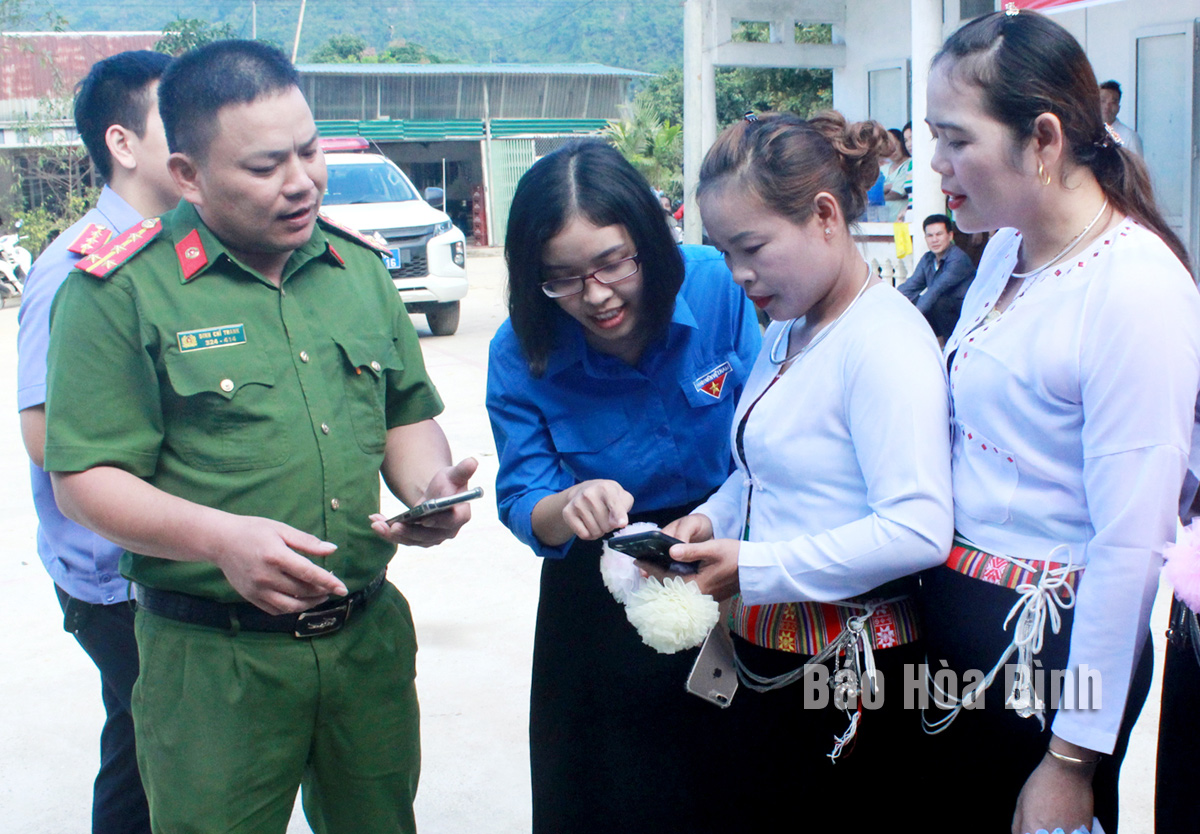
Economic development has contributed to improving the quality of life of residents in Khuoc hamlet. From a hamlet with an absolute poverty rate of 100%, Khuoc now has only nine poor households out of the total number of 50, with an average income per capita of about 35 million VND (1,420 USD) a year. The hamlet is also making positive contributions to building a new life, and new-style rural areas in Cao Son commune.

Youth union members of Luong Son district disseminate and
guide people in Khuoc hamlet to install and use online public services.
According to Bui Van Diep, Secretary of the Cao Son commune
Party Committee, Khuoc hamlet used to be an isolated area with no roads. There
was a time when the only way to get to the hamlet was to walk along a mountain
trail. In 2019, it was still the most difficult hamlet in the district and one
of the 36 most underprivileged in the province.
Bui Van Tuong, head of Khuoc hamlet, recalled that before
2020, there was no road to the hamlet, more than 50 households with more than
220 members, mainly belonging to the Muong and Dao ethnic groups, did not know
how to grow corn and cassava, or raise any animals.
Since the State supported investment in building a concrete
road from the commune centre to the hamlet in 2020, the hamlet has been given a
facelift, and its people's lives have also changed in a positive way. The
hamlet has now basically eliminated temporary and dilapidated houses.
To achieve these results, Tuong said, it is thanks to the
effective support and assistance of all levels, sectors, the drastic direction
of the commune, and the close participation of the Party cell and the hamlet
management board in encouraging and supporting people to change crop structure
and production thinking, and use new crops and varieties with high productivity
and value. As a result, corn and cassava fields have gradually been replaced by
orange and grapefruit orchards. Thanks to orange and grapefruit trees, many
households have an annual income of up to hundreds of millions of VND.
According to the Secretary of the Cao Son commune Party
Committee, local people have also focused on raising livestock and poultry,
thus earning higher economic efficiency. As a result, many households with
difficult starting points have gradually risen out of poverty.
The emulation movement "Hoa Binh joining hands to build new-style rural areas” has been widely spreading, becoming a driving force that motivates the localities to renew rural landscapes and improve the material and spiritual lives of the residents. In this movement, the people play a central role-both as the main implementers and direct beneficiaries of its outcomes.
In response to the global digital revolution, Hoa Binh Newspaper is transforming itself into a modern and multi-platform media hub, blending cutting-edge technology with a restructured newsroom and a new generation of tech-savvy journalists.
Hoa Binh province’s Association of the Elderly recently held a conference to review the project on expanding the inter-generation self-help club model until 2025.
In a move to implement Resolution No. 57-NQ/TW, issued on December 22, 2024 by the Politburo, which targets breakthroughs in science-technology development, innovation, and digital transformation, the Hoa Binh provincial Department of Health has issued a plan to roll out the "Digital Literacy for All” campaign within the local health sector.
An Nghia Commune (Lạc Sơn District) is one of the communes that achieved the tha standard of the national new rural area in 2018. Entering a new development phase, the commune is now trying to meet the criteria for the advanced new rural development. With the strong political will and the public consensus, the commune is gradually overcoming the challenges to reach this goal, aiming for the sustainable development.



